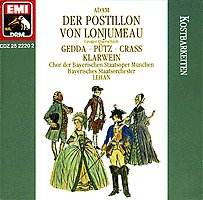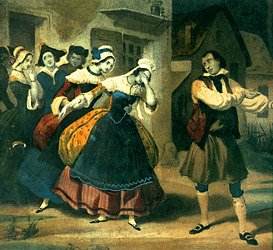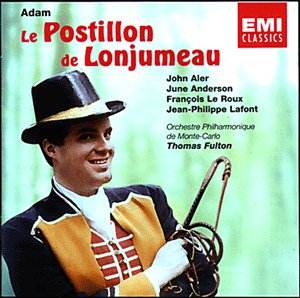This is the second EMI release of Adam’s Postillon
de Lonjumeau, the first being the  enjoyable
LP recording of 1965 in German with Gedda, Putx, Crass and which was
transferred to CD in 1990 [CDZ 252 2202]. We now have a complete recording
of it with dialogue from a stable and conductor that has done much to
revive forgotten French vocal works of the 19th Century.
We may remember that Monte-Carlo with Fulton and the Aler/Anderson partnership
brought us an excellent rare recording of Auber’s La Muette de Portici
(1820) [CDS 749 2842], a work of not dissimilar musical style to that
of Adam. (If only the UK had a similar team to bring back forgotten
British romantic operas our musical heritage would be that much richer.)
enjoyable
LP recording of 1965 in German with Gedda, Putx, Crass and which was
transferred to CD in 1990 [CDZ 252 2202]. We now have a complete recording
of it with dialogue from a stable and conductor that has done much to
revive forgotten French vocal works of the 19th Century.
We may remember that Monte-Carlo with Fulton and the Aler/Anderson partnership
brought us an excellent rare recording of Auber’s La Muette de Portici
(1820) [CDS 749 2842], a work of not dissimilar musical style to that
of Adam. (If only the UK had a similar team to bring back forgotten
British romantic operas our musical heritage would be that much richer.)
Adolphe Adam always considered his music to
be jolly, bright and comprehensible and made no excuse for it. In his
own words….
"My only aim is to write music which
is transparent, easy to understand and pleasing to the public."
With a pianist and composer father he received his
musical training at the Paris Conservatoire. An interest in composing
for the theatre was engendered by Boildeau, who pointed the lucrative
returns that such composers could receive. Adam set out on a musical
career which yielded forty lyric works, as well as around twenty vaudevilles,
ballets and opéra comiques. He is mainly remembered for his ballet
music, and in particular Giselle. Of his opéra comiques
three of the best-remembered are Si etais Roi, Le Toréador,
and of course Le Postillon de Lonjumeau. (A new production of
Si etais Roi was broadcasted by the BBC in 2000 and could possibly
be released at some future date.) Some of the Postillon score
might considered suitable as ballet music since tripping measures float
gaily throughout the work. Auber can be heard in some of his orchestral
accompaniments and motifs: a chorus number, Jeunes époux
from Act 1 of Le Postillon shares a marked similarity to the
Entr’acte and chorus to Act 2 of Auber’s Manon Lescaut. As an
uninhibited 19th Century composer, Adam has no problem in
reaching the heart with emotionally stirring melodies while his creations
flow creatively. Yet sadly he is remembered for so little nowadays.
From its opening in Paris, Le Postillon’s success took a translated
version into Germany where it enjoyed equal popularity. It reached London
a year after its Paris premiere and New York three years later in 1840.
Le Postillon de Lonjumeau contains a
simple and straightforward plot. Kurt Ganzl in his book sums the work
up neatly–
It is the tale of the top-D singing Coachman (Postillon)
who leaves his brand new wife to go of to the big city and become an
opera star. –and that in a nutshell is what it is.
In Act 1 the newly married postillon (Chapelou) and
his wife (Madeleine, an innkeeper) consult a clairvoyant who predicts
an eventful time for them. The director of the Royal Opera (the Marquis)
happens to be staying at the Inn (his carriage conveniently overturned
close by) when Chapelou is heard singing his ‘usual’ song. The young
coachman is invited to join the Marquis’s company but they have to leave
directly. With excitement he asks his friend to tell his wife where
he has gone.
Act 2 takes place ten years later. By now Madeleine
has come into an inheritance and is known as Madame Latour, Meanwhile
Chapelou has become a star at the Opera. The Marquis holds a party and
by some strange coincidence has invited Madame Latour. Chapelou falls
for the charms of her, not recognising the woman he left behind. He
proposes, she accepts, and a wedding takes place. Try the compounded
catchy part singing in track 9 is particularly delightful and is written
in a style ahead of its time with surprise change of key and pace to
run into the aria and fugal chorus could well have induced encores
In Act 3 the Marquis has gone off to inform the police
and denounce this act of bigamy. Madeleine appears in her old peasant
clothes and Chapelou recognises her. In darkness she transforms before
Chapelou’s eyes into Madame Latour, the rich heiress.
She reveals her deception to the Marquis who has appeared
with the police and declares to them her game –the couple have married
twice and vow from that day on to love like good village people. This
induces a hearty response from the chorus to provide a stirring finale.
Here we have a strong cast with both Aler and Anderson
singing delightfully and make a good partnership for their lyrical roles.
Their Act 1 Duo, Quoi, tous les deux, a musical conversation,
illustrates how well the two complement each other and how Adam has
given us much more than the recitative which other composers might have
provided. The demands of the score for the Coachman’s song require that
particularly high top notes be reached so this part needs to be cast
with care. Aler is an accomplished singer who does Adam’s character
justice but although he has a good vocal range he is a lighter tenor
when compared with the robustly confident Gedda. Throughout, Fulton
provides an energetic reading of the score in keeping with Adam’s jollity
and gets an alert response from the superb orchestra. The chorus are
sprightly but in one instance in Act 1 show a tendency to be behind
the beat. The recording perhaps lacks a little of the warmth noticeable
in EMI’s German recording yet is nicely balanced with soloists not too
closely miced and all sections of the orchestra heard.
This 2 CD set is a reissue of a CD set released in
the 1986. The recording is excellent with strong treble and considerable
vocal clarity. As is the trend nowadays, this young recording (sixteen
years old) is already being offered as a re-issue. The bargain mid-price
issue is accompanied by rather brief notes, yet one can be assured of
hearing prominent singers in a good performance.
Further reading: "Operetta", Traubner (Oxford);
‘Musicals", Ganzl (Carlton)
Raymond Walker

Pictures a) insert at top is the German EMI highlights recording of
1965 b) Scene from the operetta

![]() The Jean Laforge Choral
Ensemble
The Jean Laforge Choral
Ensemble![]() EMI 574 1062 [CD1
48.46 CD2 47.33]
EMI 574 1062 [CD1
48.46 CD2 47.33]
 enjoyable
LP recording of 1965 in German with Gedda, Putx, Crass and which was
transferred to CD in 1990 [CDZ 252 2202]. We now have a complete recording
of it with dialogue from a stable and conductor that has done much to
revive forgotten French vocal works of the 19th Century.
We may remember that Monte-Carlo with Fulton and the Aler/Anderson partnership
brought us an excellent rare recording of Auber’s La Muette de Portici
(1820) [CDS 749 2842], a work of not dissimilar musical style to that
of Adam. (If only the UK had a similar team to bring back forgotten
British romantic operas our musical heritage would be that much richer.)
enjoyable
LP recording of 1965 in German with Gedda, Putx, Crass and which was
transferred to CD in 1990 [CDZ 252 2202]. We now have a complete recording
of it with dialogue from a stable and conductor that has done much to
revive forgotten French vocal works of the 19th Century.
We may remember that Monte-Carlo with Fulton and the Aler/Anderson partnership
brought us an excellent rare recording of Auber’s La Muette de Portici
(1820) [CDS 749 2842], a work of not dissimilar musical style to that
of Adam. (If only the UK had a similar team to bring back forgotten
British romantic operas our musical heritage would be that much richer.)
